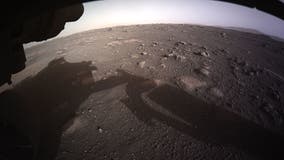Melting ice is likely causing Earth to spin faster; Here’s why that’s a problem for timekeepers
The retired Naval Observatory director of time explains why timekeepers around the world are still trying to figure out how to incorporate the increasing speed recorded over the past five years.
Sturgeon full moon: Last supermoon of 2022 rises Thursday
The last supermoon of the year, also known as the Sturgeon Moon, happens Thursday night and coincides with the peak of the Perseid meteor shower.
Perseid meteor shower peak: When and where you can see it
The Perseid meteor shower returns every year between July and August, offering sky-gazers a chance to enjoy the last weeks of the sweltering season outside, looking up at the night sky.
10 years and counting: NASA’s Curiosity continues its exploration of Mars
NASA's first rover on Mars landed in 1997. Since the 1990s, there have been four other rovers that have launched to the Red Planet.
Virgin Galactic to build ‘astronaut campus’ for future commercial space travel
The company said it will train future civilian astronauts in New Mexico ahead of their spaceflight.
Boeing to resume delivery of 787 Dreamliners after FAA clearance
Issues with the 787 started in 2020 when small gaps were found between panels of the fuselage that are made of carbon composite material.
Debris from uncontrolled, 23-ton Chinese rocket falls to Earth
China decided not to guide the booster back through the atmosphere.
Moon caves might provide year-round comfortable temperatures for astronauts living on the moon
If astronauts could breathe on the moon without a spacesuit, these lava tubes would be ideal for a light sweater.
James Webb Space Telescope to be featured on US postage stamp
The new James Webb Space Telescope Forever stamp will be available in September, but individuals can preorder the stamp in August.
Buzz Aldrin's moon-flown Apollo 11 jacket sells for record $2.8M
The Apollo 11 spaceflight jacket worn by Edwin "Buzz" Aldrin, the second man to walk on the moon in 1969 with Neil Armstrong, exceeded expectations when it sold for an astonishing $2.8 million.
Russia to drop out of International Space Station after 2024 and build own outpost
The decision to quit the ISS project comes amid soaring tensions between Russia and the West over the Kremlin's military action in Ukraine.
Tomorrow's 'Top Gun' might have drone wingman, use AI
One day, fighter pilots will “have a drone aircraft that’s flying as a loyal wingman” under their control.
NASA Mars rover discovers weird string-like object that goes viral
An image of what appeared to be a clump string on Mars went viral last week. The photos were taken by the NASA Perseverance rover's Hazard Avoidance Cameras.
Buzz Aldrin’s moon landing jacket could go for $2M at auction
Sotheby’s in New York will put several of Aldrin’s artifacts from the Apollo 11 and Gemini XII missions up for auction.
Artemis I: NASA targets Aug. 29 maiden launch of mega moon rocket from Florida
NASA said its engineers continue to prepare the Artemis I moon rocket for a late August launch from Kennedy Space Center in Florida.
Elon Musk: Mars civilization is 20-30 years after first landing
"Mars may be a fixer upper of a planet, but it has great potential," SpaceX founder Elon Musk said.
If Neptune’s orbit moves 0.1%, it could destabilize the entire solar system, study says
Thankfully, something as catastrophic as this won’t happen for millions, if not billions, of years.
SpaceX sends cargo to space station from growing Florida launch site
Almost 6,000 pounds of cargo and experiments are en route to the space station after a bright Thursday evening launch from Kennedy Space Center.
Weather watchers needed to locate clouds on Mars
To better understand Mars and its atmosphere, NASA is asking for help spotting clouds on the Red Planet.
‘Heartbeat’ radio signal detected billions of light-years from Earth
Fast radio bursts (FRB) are usually one-offs so astronomers are particularly intrigued by this most recent FRB which has a consistent burst similar to that of a beating heart.





















